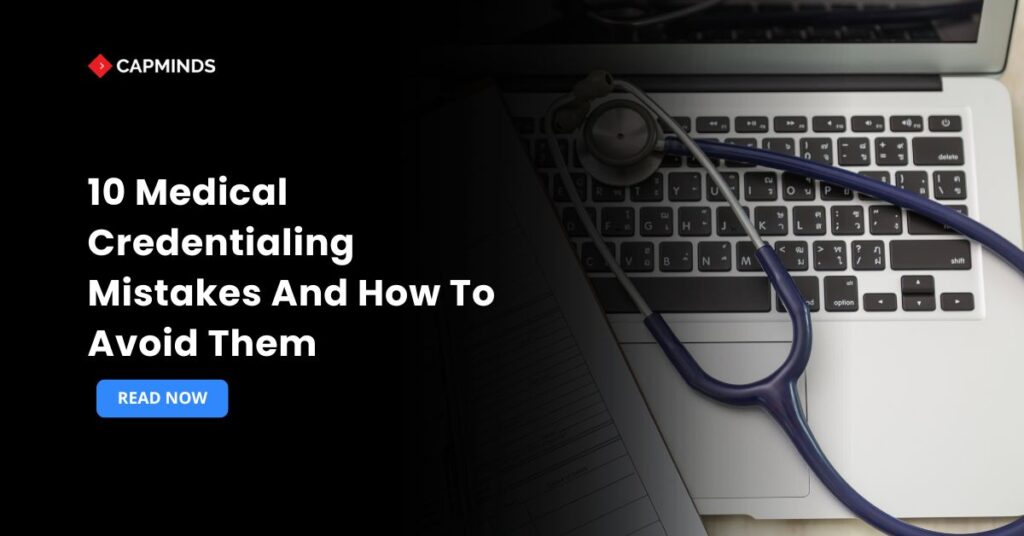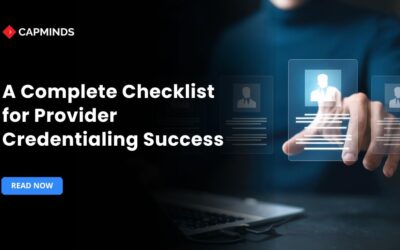10 Medical Credentialing Mistakes And How To Avoid Them
Medical credentialing is the backbone of any successful healthcare practice. It is the careful procedure of checking the qualification of a health practitioner, whether they are qualified to take care of a patient and reimburse the expenses.
It is a critical and, at the same time, a remarkably demanding and time-intensive process, full of potential traps. Medical credentialing errors may result in a major delay in the onboarding of providers, revenue losses, and even compliance problems.
You’ll know the common medical credentialing errors and practical steps on how to prevent them to streamline the operations and make the process of provider enrollment management a seamless process.
Common Mistakes in Medical Credentialing and How to Avoid Them
1. Incomplete Applications
The most frequent and frustrating error. A certain method of causing delays is to apply it with incomplete information or attachments. The applications to enroll in healthcare payers, specifically, require a tedious level of detail.
How to Prevent: Create a detailed medical credentialing checklist. Always check every part thoroughly before handing it in, and make sure that all supporting documents, such as licenses, certifications, and malpractice insurance, are provided. Think about using credentialing automation programs that are able to indicate the missing fields.
2. Ignoring Expiration Dates
There is an expiry of licenses and certifications, and even malpractice insurance policies. The inability to monitor and renew them on time may result in a lapse in credentialing, which may affect the ability of a provider to practice and bill.
Prevention Methods: Have an effective tracking system. This may be a basic spreadsheet, a special calendar, or credentialing automation software with built-in reminders. It is important to monitor all important papers proactively.
3. Failure to Update CAQH ProView
The Council for Affordable Quality Healthcare (CAQH) provides an essential medical credentialing tool. A lot of payers extract provider data directly from this database. Outdated or incorrect information in CAQH may create serious delays.
How to Prevent: Periodically update your CAQH profile. It should be a regular exercise so that all the information is up-to-date, particularly after a change in the practice of a provider, contact information, or work history. Refer to CAQH credentialing tips for best practices.
4. Lack of Communication
The credentialing process may include many departments in big organizations – the HR, billing, legal, and the providers themselves. A communication breakdown may cause duplication of efforts, loss of information, and long schedules.
Avoidance Measures: This can be avoided by creating clear lines of communication and ensuring that every team member has specific roles and responsibilities in the credentialing verification process. More frequent meetings and common digital spaces can make the collaboration more effective.
5. Underestimating the Time Commitment
Medical credentialing is not a fast process. Depending on the payer and the complexity of the application, it may require 90 to 180 days or more. The failure to estimate this time can cause frustration and financial burden.
How to Prevent: Initiate the credentialing process among new providers as early as possible. Allow sufficient time per step, from the first application filing to the last approval. You can also consider the medical credentialing services when your internal team is stretched.
Related: Medical Credentialing Outsourcing: A Smarter Path to Efficiency and Compliance
6. Data Entry Mistakes
One error made when entering the name of a provider, his/her license number, or NPI may result in delays and refusal. These apparently minor mistakes may cause a resubmission or checkout of a large part.
How to Prevent: Check all the data entries, particularly the important identification information. Institute a two-man review system on any application submitted. Employ credentialing automation software capabilities that have the capacity to reduce manual information input.
7. Ignoring State-Specific Requirements
Credentialing requirements may also differ from state to state and even between the various payers in the same state. Assuming the one-size-fits-all rule is a common mistake.
How to Avoid: Learn the medical credentialing requirements in each state and payer that applies to your practice. Keep a good record of such variations so that compliance is ensured.
8. Inadequate Follow-Up
Applying is the first step. It is a common mistake of many practices to assume that no news is good news. Applications may also be lost in the shuffle without active follow-up.
How to Avoid: Set a program of systematic follow-up with payers. Periodically monitor the application status and be ready to give any information asked for. It is also at this point that medical credentialing services may prove invaluable.
9. Lack of Understanding about Credentialing Denials
It is easy to be discouraged when a credentialing application is rejected. When not learning the reason behind the denial, you may end up committing the same errors.
How to Avoid: Thoroughly check each denial letter. Determine the particular causes of credentialing denials and leverage this feedback to succeed in further applications. Make changes to your processes according to these learnings.
10. Trying to Manage It All In-House Without Resources
Although there are cases where practices have been able to cope with credentialing internally, some are overwhelmed by the sheer volume and scope. This may cause burnout and inefficiencies in an attempt to cope with it without proper staff, expertise, or technology.
How to Prevent: Assess your internal resources and expertise. In case your team is not doing so well, you should consider outsourcing medical credentialing services.
These services focus on negotiating the complexities of the process, and your own staff can concentrate on patient care. A significant number of them provide all-inclusive provider enrollment management.
CapMinds Medical Credentialing Services: Streamline, Simplify & Stay Compliant
At CapMinds, we understand that medical credentialing is not just a compliance task; it’s the foundation of a smooth, revenue-driven healthcare operation.
Our Medical Credentialing Services are designed to remove the stress, delays, and errors that hold your practice back. From the approval application, we handle it all with precision and compliance.
With CapMinds Medical Credentialing Solutions, you get:
- Comprehensive Provider Credentialing with payers and facilities
- Automated CAQH Profile Management and data updates
- Real-time License & Certificate Tracking to prevent lapses
- Credentialing Compliance Audits to maintain network eligibility
- End-to-End Provider Enrollment Management integrated with your EHR
CapMinds ensures your providers get credentialed faster, stay compliant, and keep your revenue flowing.
Connect with CapMinds today & simplify the credentialing process.
Book Free Credentialing Consultation




